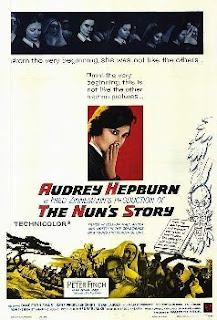The Nun's Story

One of the interesting things about looking back at 1959 is trying to imagine how or if some of these pictures could be made today. One of the nominees for Best Picture, The Nun's Story, was a big hit back then. I imagine today the idea would be a laughed out of the studio. It is a respectful, high-concept drama, a movie that people probably dressed up to see--an event. Today, an event picture has loads of CGI and action, and doesn't spend the first forty-five minutes with an almost documentarian's approach to how a woman becomes a nun.
I should say that I liked this film much more than I thought I would. I think that's mostly due to the excellent direction by Fred Zinneman, a consummate pro would made many great pictures, as diverse as High Noon and A Man For All Seasons. His direction, as well as the script, takes a clear-eyed view of what it takes to be a nun, a calling that earns both admiration and bafflement.
Audrey Hepburn stars as the daughter of a great doctor. She wants to be a nurse in the Belgian Congo (she is Belgian) and also wants to serve a higher calling, so she enters a convent as a postulant, then as a novice. We see an almost anthropological study of the protocol of such an undertaking, and it's kind of fascinating. In some ways it's like a cult, with women being stripped of their individuality, giving up everything from their life before they entered the walls of the convent--their possessions, their memories, even their names. The key things they are striving for are poverty, chastity, and obedience. Hepburn's father thinks she'll have no problem with the first two, but wonders about the third, as she is a headstrong girl. For the rest of the film, she does struggle with that, as she has pride and thinks of her patients ahead of the rules of the Church.
After serving for a while in a Brussels mental asylum (which includes a brief but memorable turn by Colleen Dewhurst as a woman who thinks she is the Archangel Gabriel) Hepburn is sent to the Congo. She works alongside a brilliant doctor (Peter Finch), a non-believer who admires her dedication but questions her appropriateness as a nun. There is the slightest hint of attraction between the two, but it's so slight that one could choose to ignore it. Today it would have been rendered as a full-blown love affair.
Hepburn is asked to return to Belgium, and because of the outbreak of World War II she can not return to Africa. The country is conquered by the Nazis, and it is here that she finally faces the ultimate test--the nuns are told to be neutral, and not favor one side over the other. She knows she must do her part to defeat the Germans, and thus makes an important decision. I won't give it away here, but I will say the final shot, which is similar in tone if not in substance to the last shot of John Ford's The Searchers, is pretty devastating.


Comments
Post a Comment